School 2017 startups from Y Combinator: "Why?" (part one)

Welcome. It CS183F, thank you for coming, we hope it will be a very good course. We're going to try to teach you what you need in the first 100 days of a startup, in fact, we will teach you how to go from raw ideas to the company.
I'm the head of Y Combinator, Sam Altman, I'm teaching these people for a long time and I hope we will be able to explain everything available. Today besides me as a guest speaker will be Dustin moskovitz.
Dustin is a co-founder and Facebook CTO and developer MVP. He is now the co-founder and CEO of Asana. Dustin speaks first, on behalf of this course, and about his appearance I say to others more often. It is about why to start a startup and it's actually a very important question, which people are not thinking. He kindly agreed to come back and tell us about it again.

— If you're here today or watching the video later, so you probably plan to create a company. So you pass this course. A large part of the course will be on how to do it and succeed. But before we delve into how to become an entrepreneur, I'm here to help you understand why.
It is important to know what's your reason to correctly make a decision. I heard about the various common motivations of potential entrepreneurs. But I found that after they had fully considered the compromise, they often come to the conclusion that the establishment of the company is not the best way to achieve their goals. I hope you will be sure that you choose the best solution. And I also explain why I like to listen to people explaining why they decided to create a company, and what I hear when I think someone is really going to succeed.
I'd given this speech before, as Sam said, and many people came up to me after and said it really helped them in making decisions. In some cases, they have decided that they don't need to create a company, they really should join an existing company. But I know that many of you are determined. If so, then no problem. I think it would still be helpful for you, as you will better understand what you have to go.
It's not a long speech, I have about 10 slides and I left some time for questions at the end. Great. And so, we call a spade a spade.
Many people become entrepreneurs directly, in order to become very rich. They see themselves creating a new Facebook or Google. However, the chances to become so successful in fact extremely small. Only a small part of the whole generations of companies ultimately achieves such heights.
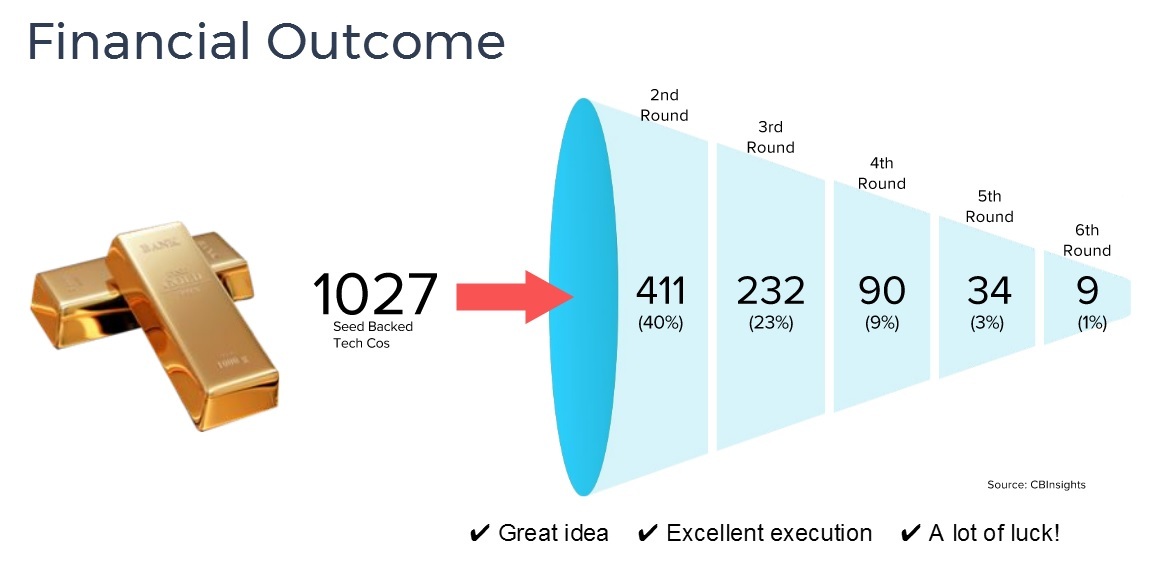
Here is the funnel with the site CBN. It shows the initial figures on how many funded tech companies receive each round of funding. So even if we moderate our ambition to desire to be a unicorn and will become a company valued at a billion dollars, we will still be incredibly long odds.
Only 1% of funded companies through the entire funnel. The passage of six turns of the funnel is not quite the same as becoming a unicorn, but is relative. Most unicorns I know are required to pass at least through a large number of turns of funding. To achieve this, you need to have a really great idea. It must be unique, defensible and capture a large market. You should do extremely well, and it means that you have to work hard, you have to attract the right people and you must have a strategy better than your competitors. And you also need to be very, very lucky, because many things can stand in your way, and a lot of that you are able to control.
I have spoken with many investors and entrepreneurs and a feeling that each time is much more difficult to pass through the funnel. Not only more and more people are starting companies and competition is correspondingly more, but work is getting more expensive for many reasons, especially here in the Bay area. Investors also higher expectations. Have you seen that the coefficients estimates begin to decline, especially on the open market. Perhaps most important, it is more difficult to interfere with officers. They are not slow giants that they were 10 or 20 years ago. They know how to take advantage of their position in the market. Some of you are thinking, they say, of course it's hard, but you get much more money as the founder and obviously this is the only way to earn a lot of money.
Let's talk about two great ways that can lead you to a wonderful salary.

First story: you are the founder, you have created a company that organizes Uber for Pets. In the picture the client, not the founder. It's a great idea and you executed it well, so at some point you sell the company for $ 100 million. If you have a really successful marginal reduction of the equity shareholders in the distribution of the net income, your capital will be 10% of the company by that time, as it becomes liquid. Therefore, you will receive $ 10 million. Quite a wonderful income.
However, I have shown only a small part of the initial set, which allowed us to get this far, so this is a good case. $ 100 million is a bit easier than $ 1 billion, but it still rarely happens. Most likely you will be left with nothing at this path, because you will close the company for any reason. And often you see the company sold to the buyer with an estimate of that range. And in many cases the founder is still left with nothing due to liquidity preference of the investor. So much depends on how much money you got to get to it. It is definitely a very risky way.
Another way to earn about the same amount of money to join the company later stage and help them to rise with estimates of 500 million to, say, 20 billion. Even being straight out of College, you can achieve a lot in financial terms, joining the company at this stage. But, especially if you have several years of experience, you will get very good options and you will also have a high salary.
I posted five main points here, so if you joined early, their can be more if you have more experience, they can be more, but it's kind of a good standard. And you probably know that the market for experienced technical professionals is incredibly competitive, especially for the roles of the product. If you make the right choice, you will also be able to get away with $ 10 million on this path. And if you make the right choice and find the next Facebook or Google while it is still not a unicorn, you can achieve a lot.
Hundredth developer Facebook has a much better salary than most entrepreneurs. Of course, it is possible that you will choose the wrong company, you will not grow to such salaries. This is the way a 40x increase, which is impressive. But the point is that you have to join much later in its development cycle. You will have more information. You can see the performance, meet with someone from the team to understand competitive environment. And even if you do not find a company that will grow to such heights, you have a good chance to choose the one that will grow to a decent level. In fact, the assessment of your capital is probably not zero. So you have an excellent chance to get a good result in this case, and it is possible to obtain very good earnings.
And finally, if you founded the company, you have a long-term contract. Chances are good that you will spend a decade or more to raise it to the desired level and, in the end, you can still fail. If you join an existing company, you can work there a couple of years to see if she has growth prospects. If not, you can easily leave and try again. In fact, you can work for several different companies in a ten year period, and it greatly increases your chances of a homerun.
The final conclusion is that there are numerous ways to obtain excellent financial results, but the risk is much lower if you join an existing company. Don't worry not everyone here will be arguments about why you should join an existing company.
Similarly, many people want to create a company to have a global impact on the world. Usually the financial result is correlated with this, therefore most have already given my arguments are applicable here as well. But when you join an existing company, you have a number of great advantages. You get access to their existing database. It could be hundreds of billions, sometimes billions of people. You have the opportunity to work on top of the infrastructure that has been built and measured and you work together with the existing team. And they will help you to succeed.
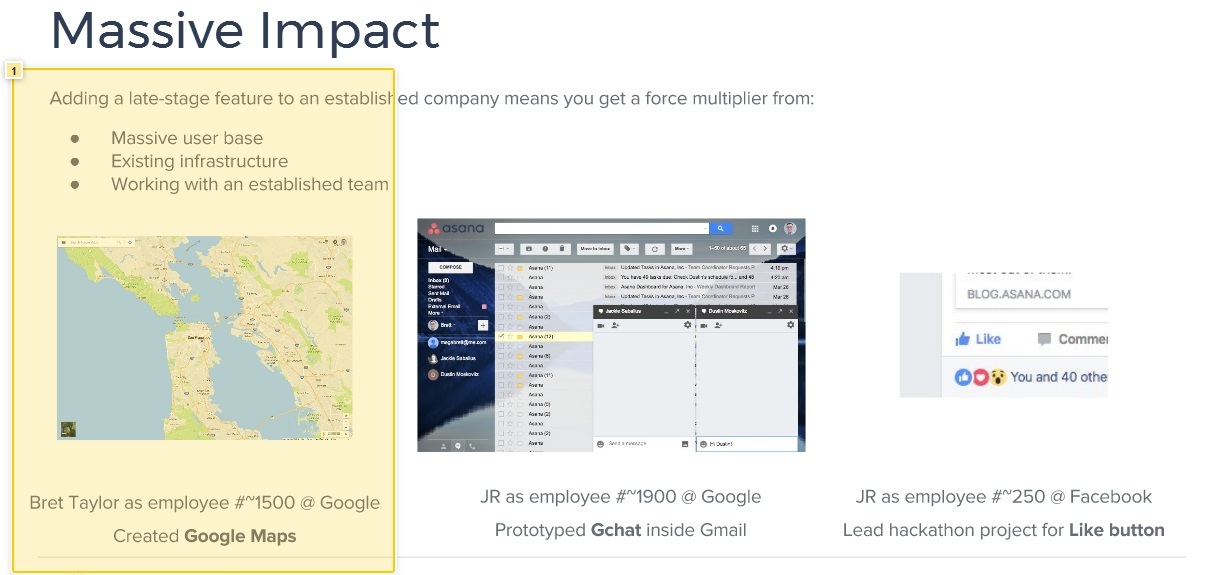
I want to give specific examples of global influence on the world that was presented to the people as employees. Bret Taylor, was the head of the Quip before becoming an entrepreneur, after he joined Google, which at that time already had more than 1000 employees. Nevertheless, he initiated the creation of Google Maps, which are used by hundreds of millions of people, including me on the way here today.
Similarly, my co-founder of Asana, Justin Rosenstein joined Google around the same time and made a prototype G-chat inside Gmail. It's been over 10 years ago, but it is still used by a lot of people. And soon after, he went to Facebook, he had several hundred employees, and he led the project of the Hackathon, which was invented the Like button. Some of you have probably used it once or twice.
So, you can still join teams like Facebook and Google today to work on something that can attract literally billions of people.
If you want to become an entrepreneur and to maximize global impact, it's the stories that you have to compare their capabilities. Then there is a way of life. Everyone has a story about what it means to be a businessman.
In General, the media likes to make it glamorous, emphasizing the launches of products in the production and funding stages. They prefer to talk about successful cases and ignore the failures. But the businessmen themselves as ducks. They are calm in appearance, but actually shaking like hell. But you can see only what is on the surface, entrepreneurs looking passionate and focused.
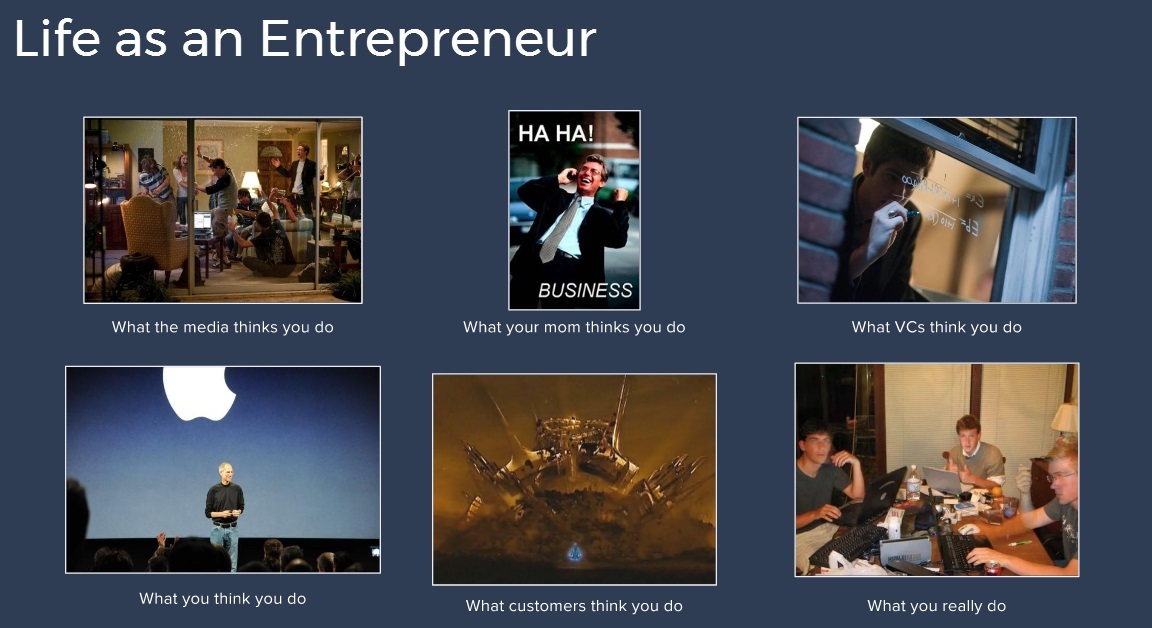
The first image here from "the Social network" is a feature film about the creation of Facebook. Looks like fun. And the last photo is a real photo create Facebook. They are a little different. The reality is a lot of chances with his head down during the hard work. We barely have enough time to open the champagne and spray them to our laptops. And so, in practice, the technology is not exactly like in "the Social network", rather as in the "Silicon valley". Everything is actually very stressful. Why? For many reasons.
First, your team relies on you. You have put their best years to the story you told them. And employers constantly pinguet during the week. You always worry that they will lose. Each round of fundraising can feel like you are on the verge of life and death and your competitors are in fact trying to kill you. And you always like a stretched string, because it's hard to find the time for the company to other significant things for your family and for yourself.
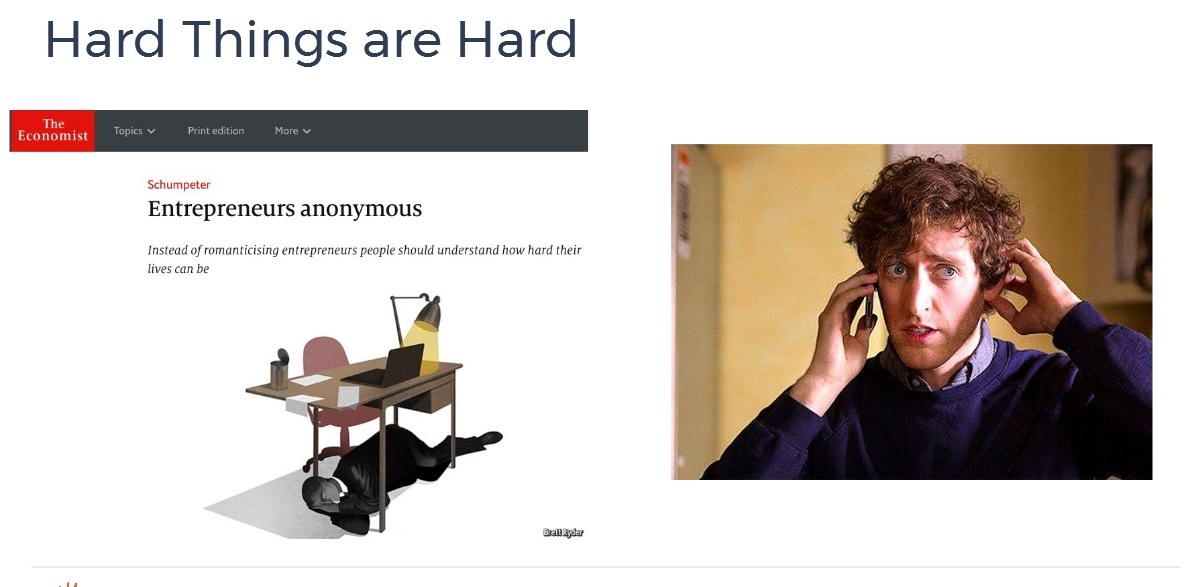
The title of the slide here is of course a reference to the book of Ben Horowitz "'t be Easy". If you want to delve into the subject, I definitely recommend reading this. So people think that being a founder you can control how you spend your time.
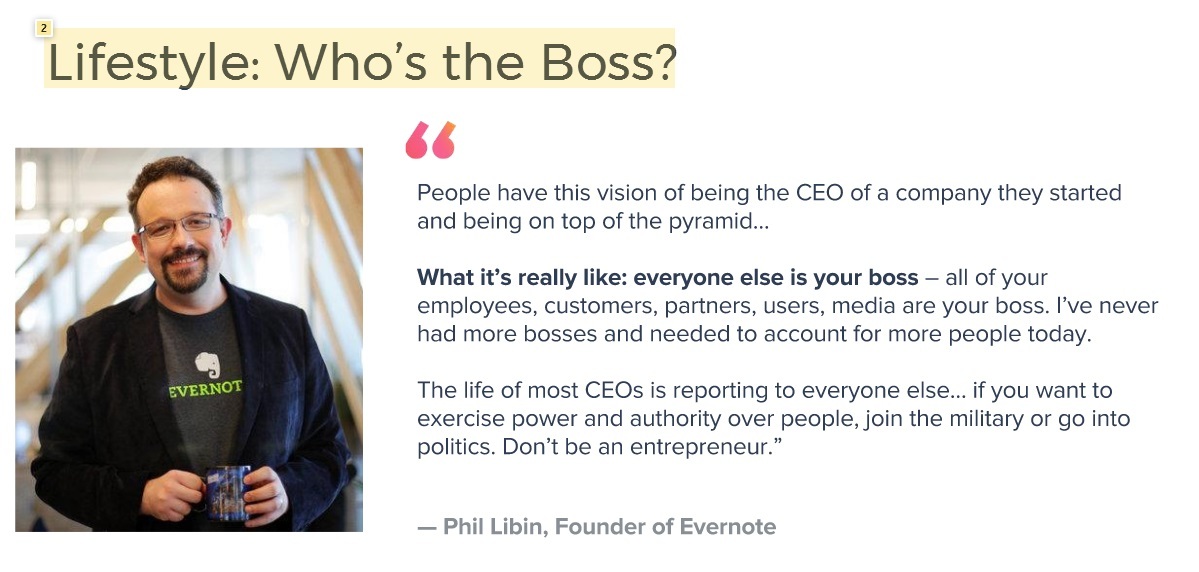
"people imagine the chief Executive of Directors of the company at the top of the pyramid...
How it really is: everyone else is your boss — all of your employees, customers, partners, users, media. They are your leaders. I have never had more leaders than now and I never had to be accountable to so many people.
The life of most CEOs is to be accountable to others... If you want to feel recognition and power over people, go in the military or in politics. Don't become entrepreneurs."
Here is a wonderful quote Phil Libin, need a second to read it. Phil and I learned this the hard way, but actually, in practice you have no control. Most of the time I spent on working on problems that I could not get anyone to instruct, in response to problems that periodically arise or solved conflicts. Moreover, you're always connected. In fact, it is almost impossible to completely disconnect while on vacation or a weekend, besides, you are a role model. So if you're slack, your team will do the same. It really is not suitable for people who do not want to have an image of the life of a businessman, you better become young entrepreneurs. Then you have, in fact, be control of your lifestyle, but the financial result and global impact will be much less.
This is a generalization of these first four topics. These are the main reasons that I usually tell people. Funnel of success that I showed you in practice suggests that startups are not the best way to maximize financial rewards and global influence. You might have more success by joining an existing company.
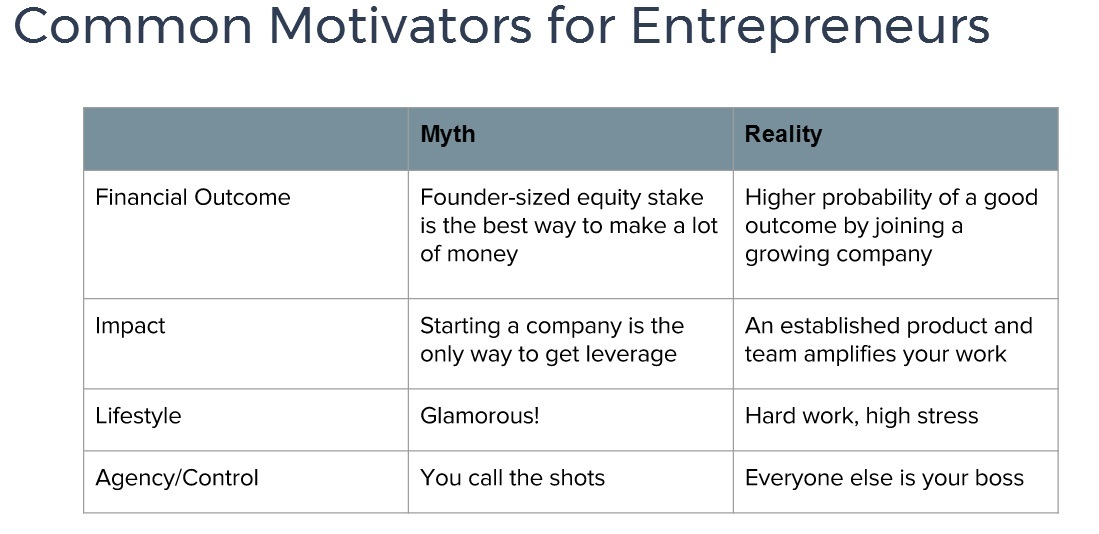
Also, the reality of entrepreneurship is usually not the same as what you see in the media. If you are aiming for a home run, you should be ready to spend many years trying and training that may be required to become a professional athlete, and still fail.
Now that I've given you some bad news, let's talk about what I think is the best reason for the creation of the company. Obviously, you can't do that for two reasons.
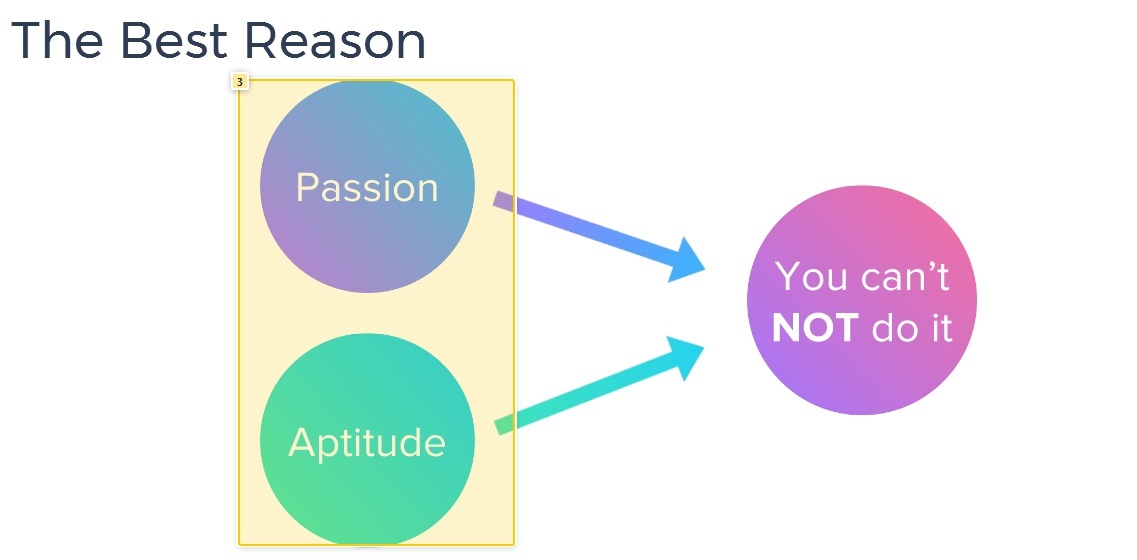
The first is passion.
Passion is very important, since we're talking about how difficult it is to create a company. You will need this passion to the beloved, to break forward. And you also need to recruit great people who will follow you as the leader.
And the second reason is that you are the very person who can bring all this to life, creating the company. If you fail to do this, you actually deprive the world of something magnificent. This suggests that the idea is very valuable and so are you the person who is best able to bring it to life. If you are that person, then that person is out there somewhere and he's probably trying to beat you and create something even more valuable. The only trick here is that perhaps you are the best person for the job, but you have to do it in the context of an existing company. I often feel like when I describe something that sounds like a great new feature of an existing product. So if you want to add something new to them, and I strongly recommend you consider Instagram or Snapchat and help them add this to their products.
You can do business in the context of an existing company. I have twice decided to become an entrepreneur and both times I was motivated by this reason. In the case of Facebook, we actually left Harvard law students as long as the website did not collect more than 100,000 active users per month. We had cognitive dissonance for a very long period of time, when we were students and we had this little project. But, in the end, we left as couldn't bear the idea not to implement this project in full. At some point, Justin was forced entrepreneurs, but we thought that the problem on which we work is very important. And that other people working on it, was going to develop a stepwise solution and, therefore, at stake was a very valuable project. We couldn't stop working on it.
In the end we decided to leave Facebook and engage in the project fully. So when I meet businessmen who are focused on success, it is a common reason that I hear from them. They create the company because they have the feeling that this is the only thing they can now do. That's it, short and sweet, we now have time for questions. I don't know, the end of my speech.
— A few minutes
— A few minutes, great. If you have questions, please raise your hand and repeat the question into the microphone. Someone always has to start a kind of observation.

— I have a question.
— How do you decide that it is better to advise people to create their own company or stick with already created? It is easy on the example photos, but in the real world, basically all is not so rosy. So in what framework you think?
— There are two things. One is a kind of feature that is the hallmark of companies like the one mentioned by mark and Tristan. I don't know how to articulate it more specifically, but I kind of think about the idea. I perceive it as a separate product and decide, would have signed someone for something like that, could this idea have your monetization model? Will people invest in learning this new system or is it more perceived as a Supplement to an already existing model? And something as close to this what think is a competitive environment. If you need to submit a brand new application for sharing photos, you will need to compete with existing applications in the distribution and network effects, which is a huge obstacle. There are also other metaphors and other products. Okay?
— Yes.
Is a part view of the product.
— Come on you, and then you.
— I'm curious what you think about the problems of establishment of the company in the old days and about the problems of today for the first time?
— I sort of summarized them when he talked about the funnel. Oh, sorry, the question was what is the difference in problems during the creation of the company, for example, in 2004 and the establishment of the company today or the second time in 2009. I kind of brought them down, when he talked about the funnel. But I definitely think that compared to other types of businesses this is much more competitive. Most of the securities markets already have interesting players. Also high competitiveness in the recruiting market. It is very difficult to obtain a sufficiently large team of fairly talented people and these people will cost more. This is one of the areas in which jumped price, and there are a number of others, including property that is very expensive today. Some prices declined, for example, in data centers, but, in General, prices are higher and accordingly more difficult to qualify.
— I mentioned the comparison between startups, being a founder and being yourself. As the position or perhaps for the first time people attempt this kind of effect?
— So many more things in this range. Sorry, the question is, what is the difference between the case when you're sort of a late employee in an existing company and the case when you're an early employee? This is the question, right? I think of it as the range of the risk score between the Creator of the company and its thousandth employee. If you are in the top ten, you have a little more information, do you know who founded this company, you know the leaders. You can meet some of the investors. I hope that they have already passed the first round of the funnel, or turn A, but often you have no data on revenue or monetization. And perhaps the product has not been evaluated. It's kind of a long range and the sooner you come, the lower your salary, the lower the probability of getting a positive return. But you also have the opportunity to get a great result because you can, there are 50 major cases or 100 major cases, if you are one of the first employees. Okay?
— Whether the probability of success between the employee and one of the founders about the same?
Again on the range, right? The question was about whether the probability of success is approximately the same? For the second employee, Yes, for the tenth employee no, they have much more information. To 20 employees more and it will be a continuous spectrum.
— The question here.
— How you found your main team, when you founded Facebook? It happened naturally or you have chosen the best in each region?
— Of course, as we found the main team? In Facebook quite naturally, many people were like people from our network at Harvard, which we moved to the West of Palo Alto. Early on we hired Mark Collier and he has recruited and helped us to get into the network of Stanford and many of the people we hired had just graduated from University at that time. And at first we were very focused on the team product. Much depended on the way the natural and workplace networks. It's a little different, in a small company you can't work with a contractor, employers and even some services that help to connect with people. And I think it's very good. Next question.
— I was thinking about a dimension of enthusiasm. What do you think about the stages of interest to pathological obsession?
The question is this: when I was talking about passion, if I told only about the interest of the subject or on pathological obsession? It is again a range, but in relation to pathological obsession. For example, when I say "you can't do that", sometimes you look back 20 years later and you're like, "I really had to grasp this idea, it was very important for me." What about interest me a lot are interested in the world, but not all of it necessarily important and not everyone will get my attention for 10 or 20 years.
— What time?
— One more question.
— I build not a product or idea, do I always have to have a co-founder and, if so, how am I supposed to find him?
The question is always whether you should be a co-founder and if so, how to find him? It is quite a complex question. I was convinced that the co-founders is incredibly important. Again, because it is very difficult and you have a buddy on whom you can rely and he is with you in the same boat. But if you don't have a specific person with whom you want to work, I can't give good advice about what to do in both cases. We create the company together, we discuss it together all the time. This whole so-called "dates," with the founders to me is meaningless. I think the establishment of the company is a more important relationship than marriage or something like that, because financial issues come between you more often. And the breakup is very bad. I highly recommend working with someone you already know and discuss as many details as possible to be sure that you understand each other, because then these conversations will become much heavier. Well, finish?
Thank You, Dustin. It was great.

Translation: Diana Eremeeva
Continued
Who's ready to help with the translation of the following lectures or improving an existing translation — write to the PM.
the
Full video:
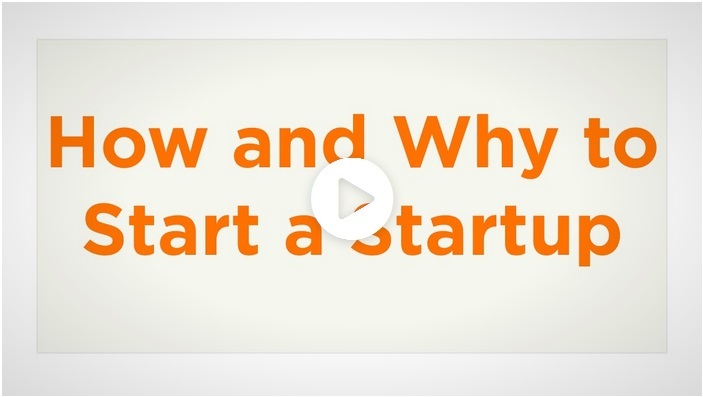
UPD
Here colleagues from the Studio of GaleonRec announced:
Комментарии
Отправить комментарий